agreement
-
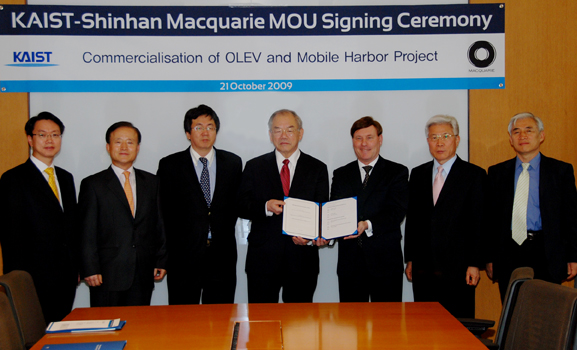 KAIST Signs MOU with Macquarie for Cooperation in Green Growth Projects
KAIST and Shinhan Macquarie Financial Advisory Co. have reached an agreement for cooperation in the development and commercialization of the KAIST-led two national green growth projects, On-line Electric Vehicle (OLEV) and Mobile Harbor (MH) programs, university authorities said.
KAIST President Nam-Pyo Suh signed a memorandum of understanding with John Walker, Chairman of Macquarie Group of Companies in Korea, and Woo-Gon Hwang, Representative Director of Shinhan Macquarie Financial Advisory Co. on Wednesday, Oct. 21.
Under the agreement, KAIST and Macquarie will cooperate in developing an optimal business structure for a rapid commercialization of OLEV and MH. Specifically, Shinhan Macquarie Financial Advisory will provide financial advice, including basis financial analysis, potential investor inducement and feasibility analysis of the projects.
Shinhan Macquarie Financial Advisory Co. is a joint venture between Shinhan Financial Group of Korea and the Australia-based Macquarie Bank Group which provides global investment banking and diversified financial services.
KAIST"s OLEV is a project to develop a new growth engine for Korea and lead the future of global automotive industry. It is an entirely new concept: the electric vehicle picks up power from underground power supplier lines, while either running or standing, through the non-contact magnetic charging method.
The MH program is designed to develop a system that can load/unload containers from a containership in the open sea and deliver them to their destinations at the harbor.
The Korean government has included these KAIST projects, which both are great technical and engineering challenges, in the nation"s sustainable growth programs, providing substantial research grants. KAIST offers its advanced research capabilities for the nation"s efforts to achieve efficient, environment-friendly utilization of resources as new growth engines that spur the development of related industries and explore global markets.
2009.10.22 View 17363
KAIST Signs MOU with Macquarie for Cooperation in Green Growth Projects
KAIST and Shinhan Macquarie Financial Advisory Co. have reached an agreement for cooperation in the development and commercialization of the KAIST-led two national green growth projects, On-line Electric Vehicle (OLEV) and Mobile Harbor (MH) programs, university authorities said.
KAIST President Nam-Pyo Suh signed a memorandum of understanding with John Walker, Chairman of Macquarie Group of Companies in Korea, and Woo-Gon Hwang, Representative Director of Shinhan Macquarie Financial Advisory Co. on Wednesday, Oct. 21.
Under the agreement, KAIST and Macquarie will cooperate in developing an optimal business structure for a rapid commercialization of OLEV and MH. Specifically, Shinhan Macquarie Financial Advisory will provide financial advice, including basis financial analysis, potential investor inducement and feasibility analysis of the projects.
Shinhan Macquarie Financial Advisory Co. is a joint venture between Shinhan Financial Group of Korea and the Australia-based Macquarie Bank Group which provides global investment banking and diversified financial services.
KAIST"s OLEV is a project to develop a new growth engine for Korea and lead the future of global automotive industry. It is an entirely new concept: the electric vehicle picks up power from underground power supplier lines, while either running or standing, through the non-contact magnetic charging method.
The MH program is designed to develop a system that can load/unload containers from a containership in the open sea and deliver them to their destinations at the harbor.
The Korean government has included these KAIST projects, which both are great technical and engineering challenges, in the nation"s sustainable growth programs, providing substantial research grants. KAIST offers its advanced research capabilities for the nation"s efforts to achieve efficient, environment-friendly utilization of resources as new growth engines that spur the development of related industries and explore global markets.
2009.10.22 View 17363 -
 KAIST Wins Official Membership of ERCIS
The Center for Software Policy Study of KAIST has recently become the 20th official member of the European Research Center for Information Systems (ERCIS) by signing an agreement with the organization, university authorities said on Thursday (Oct. 22).
The ERCIS is a network of scientists who conduct cooperative research in the field of integrated information systems development and organizational design. The Center undertakes interdisciplinary research with the participation of computer scientists, business management experts and law scholars.
KAIST will seek to activate exchange of professors, research fellows and graduate students with ERCIS members, as well as implementing credit exchange and dual degree programs.
ERCIS, was first organized by the German state of North Rhine-Westfahlia, is currently managed by the University of Muenster, a global leader in the field of information systems and business administration. Joining the ERCIS are one university each from New Zealand, the Netherlands, Germany, Russia, Liechtenstein, the United States, Switzerland, Spain, Slovenia, Ireland, Britain, Austria, Italy, the Czech Republic, Poland, France, Finland and Australia.
KAIST"s Center for Software Policy Study is currently preparing for the establishment of a support system for developers of the mobile application software as part of the EUREKA project. Korea is playing a leading role in this project on the strength of its competitiveness in the mobile phone industry.
EUREKA is a pan-European intergovernmental network for market-oriented, industrial R&D aimed at enhancing European competitiveness through its support to businesses, research centers and universities who carry out pan-European projects to develop innovative products, processes and services.
2009.10.22 View 16580
KAIST Wins Official Membership of ERCIS
The Center for Software Policy Study of KAIST has recently become the 20th official member of the European Research Center for Information Systems (ERCIS) by signing an agreement with the organization, university authorities said on Thursday (Oct. 22).
The ERCIS is a network of scientists who conduct cooperative research in the field of integrated information systems development and organizational design. The Center undertakes interdisciplinary research with the participation of computer scientists, business management experts and law scholars.
KAIST will seek to activate exchange of professors, research fellows and graduate students with ERCIS members, as well as implementing credit exchange and dual degree programs.
ERCIS, was first organized by the German state of North Rhine-Westfahlia, is currently managed by the University of Muenster, a global leader in the field of information systems and business administration. Joining the ERCIS are one university each from New Zealand, the Netherlands, Germany, Russia, Liechtenstein, the United States, Switzerland, Spain, Slovenia, Ireland, Britain, Austria, Italy, the Czech Republic, Poland, France, Finland and Australia.
KAIST"s Center for Software Policy Study is currently preparing for the establishment of a support system for developers of the mobile application software as part of the EUREKA project. Korea is playing a leading role in this project on the strength of its competitiveness in the mobile phone industry.
EUREKA is a pan-European intergovernmental network for market-oriented, industrial R&D aimed at enhancing European competitiveness through its support to businesses, research centers and universities who carry out pan-European projects to develop innovative products, processes and services.
2009.10.22 View 16580 -
 KAIST College of Life Sciences and Bioengineering Signs MOU with Harvard
KAIST’s College of Life Sciences and Bioengineering recently signed a memorandum of understanding (MOU) with Harvard University’s Center for Brain Science on July 20, which will allow for joint research and exchange in researchers between the two institutions.
Headed by Director Kenneth Blum, Harvard’s Center for Brain Science leads the world in brain-related research. The new MOU will allow for research cooperation, exchanges of professors, researchers, and students, joint usage of infrastructure and research materials, and finally, sharing of research assignments.
The Dean of the College of Life Sciences and Bioengineering Sang Yup Lee, who concerted efforts to form the MOU said, “This agreement will bring together two of the world’s leading brain-related research teams, and I hope that combining their expertise will bring great advances in brain science and engineering.
KAIST’s College of Life Science and Bioengineering, which is known for its creative interdisciplinary research, is producing exemplary research results in the field of brain science from its Biological Sciences and Bio and Brain Engineering departments.
In addition to cooperation with Harvard, KAIST has also formed partnerships with Emory University, Japan’s RIKEN Brain Institute, and Germany’s Max Planck Institute. Not only does it have a worldwide network pertaining to brain research, but KAIST has also engaged in cooperative research with prominent domestic institutions such as, Asan Medical Center, the Korea Research Institute of Bioscience and Biotechnology, the Korea Research Institute of Standards and Science, and the SK Corporation. Through these connections, KAIST has managed to lead in mutually cooperative brain interdisciplinary research.
2009.08.10 View 21014
KAIST College of Life Sciences and Bioengineering Signs MOU with Harvard
KAIST’s College of Life Sciences and Bioengineering recently signed a memorandum of understanding (MOU) with Harvard University’s Center for Brain Science on July 20, which will allow for joint research and exchange in researchers between the two institutions.
Headed by Director Kenneth Blum, Harvard’s Center for Brain Science leads the world in brain-related research. The new MOU will allow for research cooperation, exchanges of professors, researchers, and students, joint usage of infrastructure and research materials, and finally, sharing of research assignments.
The Dean of the College of Life Sciences and Bioengineering Sang Yup Lee, who concerted efforts to form the MOU said, “This agreement will bring together two of the world’s leading brain-related research teams, and I hope that combining their expertise will bring great advances in brain science and engineering.
KAIST’s College of Life Science and Bioengineering, which is known for its creative interdisciplinary research, is producing exemplary research results in the field of brain science from its Biological Sciences and Bio and Brain Engineering departments.
In addition to cooperation with Harvard, KAIST has also formed partnerships with Emory University, Japan’s RIKEN Brain Institute, and Germany’s Max Planck Institute. Not only does it have a worldwide network pertaining to brain research, but KAIST has also engaged in cooperative research with prominent domestic institutions such as, Asan Medical Center, the Korea Research Institute of Bioscience and Biotechnology, the Korea Research Institute of Standards and Science, and the SK Corporation. Through these connections, KAIST has managed to lead in mutually cooperative brain interdisciplinary research.
2009.08.10 View 21014 -
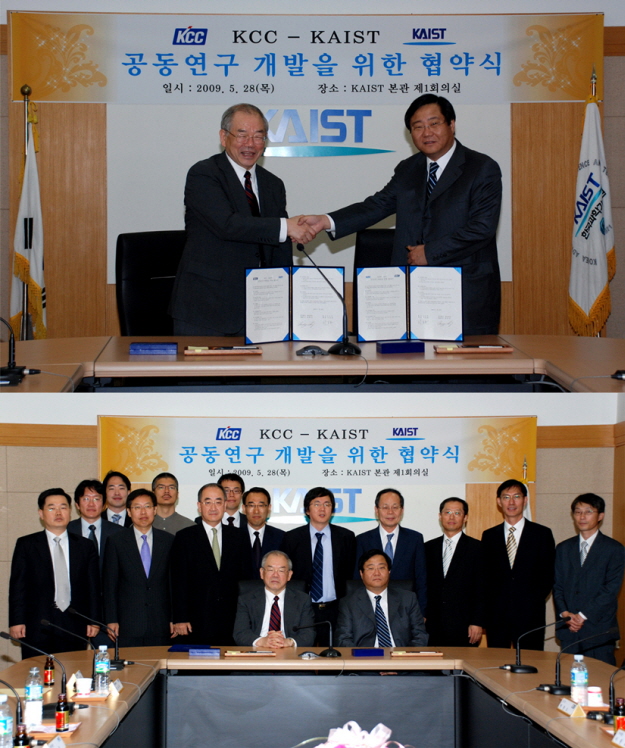 KAIST Signs Agreement for Industry-Academia Cooperation with KCC
KAIST signed an agreement for industry-academia cooperation with KCC, Korea"s leading supplier of building & industrial materials, on May 28, university sources said.
The agreement signed by KAIST President Nam-Pyo Suh and Mong-Jin Chung, Chairman of the KCC Business Group, calls for KAIST and KCC to conduct joint research for the development of new technologies in nano science, new materials areas and interdisciplinary areas.
Under the agreement, KCC will invest 5 billion won into the KAIST Institute for the NanoCentury over the next five years.
KCC Chairman Chung said: "Through this industry-academia cooperation agreement, we are seeking to give part of our profits back to community . We hope this agreement to contribute to the development of core technologies of the future in the new materials field, and nurturing specialized manpower."
2009.05.28 View 16524
KAIST Signs Agreement for Industry-Academia Cooperation with KCC
KAIST signed an agreement for industry-academia cooperation with KCC, Korea"s leading supplier of building & industrial materials, on May 28, university sources said.
The agreement signed by KAIST President Nam-Pyo Suh and Mong-Jin Chung, Chairman of the KCC Business Group, calls for KAIST and KCC to conduct joint research for the development of new technologies in nano science, new materials areas and interdisciplinary areas.
Under the agreement, KCC will invest 5 billion won into the KAIST Institute for the NanoCentury over the next five years.
KCC Chairman Chung said: "Through this industry-academia cooperation agreement, we are seeking to give part of our profits back to community . We hope this agreement to contribute to the development of core technologies of the future in the new materials field, and nurturing specialized manpower."
2009.05.28 View 16524 -
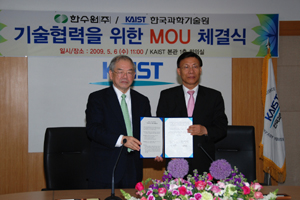 KAIST, KHNP Sign MOU on Nuclear Technology Development
KAIST signed a memorandum of understanding with the Korea Hydro & Nuclear Power Co. (KHNP) on Wednesday (May 6) to upgrade cooperation between the two organizations in nuclear power technology development.
On hand at the signing ceremony at KAIST were KAIST President Nam-Pyo Suh, KHNP President Jong-Shin Kim and other related officials.
The agreement calls for increased efficiency and synergy effect in the development of nuclear power generation by KAIST and KHNP to gain greater competitiveness in the exportation of nuclear power technologies.
KHNP is responsible for the operation of all nuclear and hydraulic power plants in Korea which supply about 40 percent of the nation"s electric power demand. It is the largest among the six power generating subsidiaries that separated from Korea Electric Power Corporation (KEPCO) in April 2001.
2009.05.07 View 14215
KAIST, KHNP Sign MOU on Nuclear Technology Development
KAIST signed a memorandum of understanding with the Korea Hydro & Nuclear Power Co. (KHNP) on Wednesday (May 6) to upgrade cooperation between the two organizations in nuclear power technology development.
On hand at the signing ceremony at KAIST were KAIST President Nam-Pyo Suh, KHNP President Jong-Shin Kim and other related officials.
The agreement calls for increased efficiency and synergy effect in the development of nuclear power generation by KAIST and KHNP to gain greater competitiveness in the exportation of nuclear power technologies.
KHNP is responsible for the operation of all nuclear and hydraulic power plants in Korea which supply about 40 percent of the nation"s electric power demand. It is the largest among the six power generating subsidiaries that separated from Korea Electric Power Corporation (KEPCO) in April 2001.
2009.05.07 View 14215 -
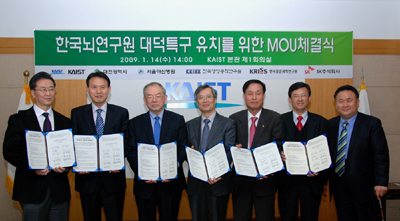 Six Organizations Join Forces to Induce Projected National Brain Institute to Daejeon
Six major organizations including KAIST have joined forces to help Daejeon City to win the government approval to build the envisioned Korean Brain Institute in Daedeok Research Complex.
The six organizations signed a memorandum of understanding on cooperating in establishing the government-funded institute built within the Daedeok Research Complex in the city of Daejeon, at KAIST on Jan. 14. The six organizations are KAIST, the Daejeon City Government, Korea Research Institute of Bioscience and Biotechnology, Korea Research Institute of Standard and Science, Asan Medical Center, and SK Corp., a pioneer in effective therapeutic invention for serious brain disorders.
The partnership of the six organizations is expected to bring a broad-based cooperation opportunities and create a massive synergy effect in the brain science researches and the development of new therapeutic treatment for brain disorders by combining their resources and infrastructures.
The six organizations have also built an international research network with such globally-renowned brain research institutions as RIKEN, a large natural sciences research institute in Japan, Max Plank Institute in Germany, Federal Institute of Technology, Lausanne, in Switzerland and Brain Research Institute of University of Queensland in Australia. The research network is under the support and guidance of Dennis Choi, a prominent neuroscientist who once served as the President of the Society for Neuroscience and is currently a professor in the Departments of Neurology and biology at Emory University.
The tentatively titled Korea Brain Institute is envisioned to help fight brain disorders and create Korea"s new growth engine, as well as lengthening life span, by conducting convergence researches in nero science, brain science and pharmacology. If the consortium of the six organizations wins the government approval to build the proposed institute within the Daedeok complex, the central government and the Daejeon city government are expected to pour a total of 329.7 billion won into the project by 2020.
2009.01.14 View 21975
Six Organizations Join Forces to Induce Projected National Brain Institute to Daejeon
Six major organizations including KAIST have joined forces to help Daejeon City to win the government approval to build the envisioned Korean Brain Institute in Daedeok Research Complex.
The six organizations signed a memorandum of understanding on cooperating in establishing the government-funded institute built within the Daedeok Research Complex in the city of Daejeon, at KAIST on Jan. 14. The six organizations are KAIST, the Daejeon City Government, Korea Research Institute of Bioscience and Biotechnology, Korea Research Institute of Standard and Science, Asan Medical Center, and SK Corp., a pioneer in effective therapeutic invention for serious brain disorders.
The partnership of the six organizations is expected to bring a broad-based cooperation opportunities and create a massive synergy effect in the brain science researches and the development of new therapeutic treatment for brain disorders by combining their resources and infrastructures.
The six organizations have also built an international research network with such globally-renowned brain research institutions as RIKEN, a large natural sciences research institute in Japan, Max Plank Institute in Germany, Federal Institute of Technology, Lausanne, in Switzerland and Brain Research Institute of University of Queensland in Australia. The research network is under the support and guidance of Dennis Choi, a prominent neuroscientist who once served as the President of the Society for Neuroscience and is currently a professor in the Departments of Neurology and biology at Emory University.
The tentatively titled Korea Brain Institute is envisioned to help fight brain disorders and create Korea"s new growth engine, as well as lengthening life span, by conducting convergence researches in nero science, brain science and pharmacology. If the consortium of the six organizations wins the government approval to build the proposed institute within the Daedeok complex, the central government and the Daejeon city government are expected to pour a total of 329.7 billion won into the project by 2020.
2009.01.14 View 21975 -
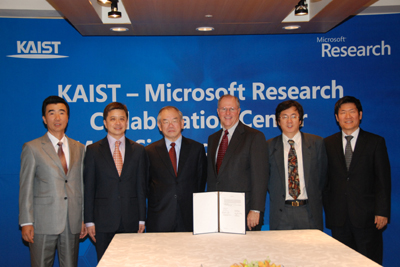 KAIST, Microsoft Research to Set up Research Collaboration Center
KAIST, Korea"s premier institution for science and technology research and education, and Microsoft Research (MSR), the research arm of Microsoft Corp, signed a memorandum of understanding (MOU) to establish a joint research collaboration center in Korea on Oct. 20.
The research collaboration center to be located at the KAIST campus in the Daedeok science and technology town 150 kilometers south of Seoul will be dedicated to promoting joint researches, curriculum innovation, talent fostering and academic exchange in the Asian region.
The MOU signing ceremony at the Westin Chosun Hotel in Seoul was attended by President Nam-Pyo Suh and Vice President Soon-Heung Chang from KAIST, and Craig Mundie, Chief Research and Strategy Officer of Microsoft Corp, and Hsiao-Wuen Hon, Managing Director of MSR Asia from Microsoft.
“We are excited to be working so closely with Microsoft Research,” KAIST President Suh said. “This is the first of many alliances we hope to establish with the world’s industrial leaders that will enable us to resolve some of the toughest problems in computer science and accelerate the next generation of innovation in computing technology and its application in other scientific researches.”
Dr. Hon said: “For over 10 years, Microsoft Research has been committed to working with leading universities throughout Asia to spur computer science research and to strengthen Asia’s knowledge economies by helping foster their capabilities. The Microsoft-KAIST Research Collaboration Center demonstrates our continued efforts to strengthen relations with universities in Korea and build new partnerships with academia here.”
In the last three years, Microsoft Research and KAIST have engaged in close collaboration through research projects, student support programs, and various academic exchange activities. One of the major projects was to construct software development library specifically dedicated to systems biology. A number of excellent students from KAIST participated in the internship program at Microsoft Research in Beijing, China and Redmond, United States.
The establishment of the Microsoft-KAIST research collaboration center will bring the collaborative relations between KAIST and MSR to a new level. The center will provide a platform which unites the innovative minds of KAIST and Microsoft Research to develop technologies that will impact the way people live, learn, work, and play, a KAIST spokesman said.
2008.10.30 View 20461
KAIST, Microsoft Research to Set up Research Collaboration Center
KAIST, Korea"s premier institution for science and technology research and education, and Microsoft Research (MSR), the research arm of Microsoft Corp, signed a memorandum of understanding (MOU) to establish a joint research collaboration center in Korea on Oct. 20.
The research collaboration center to be located at the KAIST campus in the Daedeok science and technology town 150 kilometers south of Seoul will be dedicated to promoting joint researches, curriculum innovation, talent fostering and academic exchange in the Asian region.
The MOU signing ceremony at the Westin Chosun Hotel in Seoul was attended by President Nam-Pyo Suh and Vice President Soon-Heung Chang from KAIST, and Craig Mundie, Chief Research and Strategy Officer of Microsoft Corp, and Hsiao-Wuen Hon, Managing Director of MSR Asia from Microsoft.
“We are excited to be working so closely with Microsoft Research,” KAIST President Suh said. “This is the first of many alliances we hope to establish with the world’s industrial leaders that will enable us to resolve some of the toughest problems in computer science and accelerate the next generation of innovation in computing technology and its application in other scientific researches.”
Dr. Hon said: “For over 10 years, Microsoft Research has been committed to working with leading universities throughout Asia to spur computer science research and to strengthen Asia’s knowledge economies by helping foster their capabilities. The Microsoft-KAIST Research Collaboration Center demonstrates our continued efforts to strengthen relations with universities in Korea and build new partnerships with academia here.”
In the last three years, Microsoft Research and KAIST have engaged in close collaboration through research projects, student support programs, and various academic exchange activities. One of the major projects was to construct software development library specifically dedicated to systems biology. A number of excellent students from KAIST participated in the internship program at Microsoft Research in Beijing, China and Redmond, United States.
The establishment of the Microsoft-KAIST research collaboration center will bring the collaborative relations between KAIST and MSR to a new level. The center will provide a platform which unites the innovative minds of KAIST and Microsoft Research to develop technologies that will impact the way people live, learn, work, and play, a KAIST spokesman said.
2008.10.30 View 20461 -
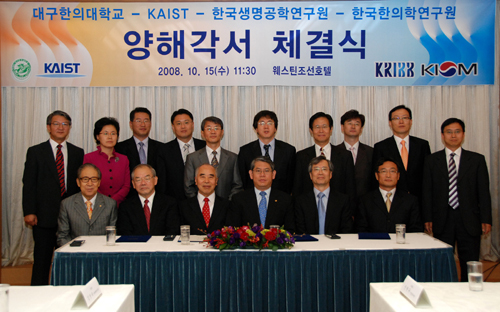 KAIST, KRIBB Agree to Cooperate in Research of Convergence Technologies
Oct. 15, 2008 -- KAIST and Korea Research Institute of Bioscience and Biotechnology (KRIBB) have agreed to cooperate in the research of convergence fields of biotechnology, information technology and nanotechnology.
To this end, the two institutions concluded a memorandum of understanding to create a new academia-institute cooperative model in the convergence fields on Oct. 15 in Seoul, with KAIST President Nam-Pyo Suh, KRIBB Director Young-Hoon Park and Vice Minister of Education, Science and Technology Jong-Koo Park in attendance.
Under the agreement, the two institutions will set up the tentatively-named KAIST-KRIBB BINT Convergence Institute for the development of technologies and nurturing skilled manpower in the convergence fields.
The partnership of the two institutions is expected to bring broad-based cooperation opportunities and create a massive synergy effect by combining their resources and infrastructure for the development of convergence technologies, KAIST officials said..
The proposed institute is also designed to build a world-class research hub in systems biotechnology by combining strengths of the two institutions with initiatives to achieve the Korean government"s new vision for "low carbon, green growth."
The institute will also serve as a base for domestic brain convergence by concentrating the nation"s research capacities in genetics and brain technology.
KAIST also signed a memorandum of understanding for cooperation in researches in Oriental medicine with three institutions, KRIBB, Daegu Hanny University and Korea Institute of Oriental Medicine.
The agreement calls for the four institutions to conduct joint researches in traditional sciences and Oriental medicine based on systems biology, develop manpower in related fields and share academic and research information.
The agreement is expected to provide impetus to reinforcing competitiveness in compound and convergence technologies and discover new properties in Oriental medicine, according to KAIST authorities.
2008.10.16 View 20558
KAIST, KRIBB Agree to Cooperate in Research of Convergence Technologies
Oct. 15, 2008 -- KAIST and Korea Research Institute of Bioscience and Biotechnology (KRIBB) have agreed to cooperate in the research of convergence fields of biotechnology, information technology and nanotechnology.
To this end, the two institutions concluded a memorandum of understanding to create a new academia-institute cooperative model in the convergence fields on Oct. 15 in Seoul, with KAIST President Nam-Pyo Suh, KRIBB Director Young-Hoon Park and Vice Minister of Education, Science and Technology Jong-Koo Park in attendance.
Under the agreement, the two institutions will set up the tentatively-named KAIST-KRIBB BINT Convergence Institute for the development of technologies and nurturing skilled manpower in the convergence fields.
The partnership of the two institutions is expected to bring broad-based cooperation opportunities and create a massive synergy effect by combining their resources and infrastructure for the development of convergence technologies, KAIST officials said..
The proposed institute is also designed to build a world-class research hub in systems biotechnology by combining strengths of the two institutions with initiatives to achieve the Korean government"s new vision for "low carbon, green growth."
The institute will also serve as a base for domestic brain convergence by concentrating the nation"s research capacities in genetics and brain technology.
KAIST also signed a memorandum of understanding for cooperation in researches in Oriental medicine with three institutions, KRIBB, Daegu Hanny University and Korea Institute of Oriental Medicine.
The agreement calls for the four institutions to conduct joint researches in traditional sciences and Oriental medicine based on systems biology, develop manpower in related fields and share academic and research information.
The agreement is expected to provide impetus to reinforcing competitiveness in compound and convergence technologies and discover new properties in Oriental medicine, according to KAIST authorities.
2008.10.16 View 20558 -
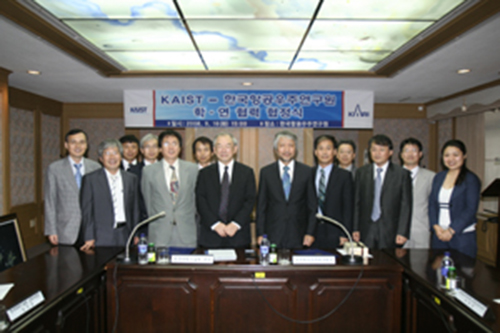 KAIST, KARI to Conduct Joint Research, Exchange Tech Manpower
KAIST and the Korea Aerospace Research Institute (KARI) have agreed to conduct joint researches and exchange technical personnel in order to spur research activities on artificial satellite and other aerospace technology, KAIST announced Wednesday, Sept. 17.
An MOU was signed in a ceremony at the KARI Tuesday, attended by senior officials of the two institutions which both are located in the Daedeok Technopolis in Daejeon City.
Researchers from KARI will participate in KAIST"s interdisciplinary project of "Space Exploratory Engineering" and the two organizations will also jointly take part in the International Lunar Network (ILN), an international moon exploration program, to accelerate development of space technology in Korea.
As a result of the tieup, Dr. Lee So-yeon, Korea"s first astronaut who lived in space for a week aboard a Russian spacecraft this year, will be able to teach and conduct research at KAIST as an adjunct professor. Lee earned her doctorate from KAIST.
2008.09.17 View 19091
KAIST, KARI to Conduct Joint Research, Exchange Tech Manpower
KAIST and the Korea Aerospace Research Institute (KARI) have agreed to conduct joint researches and exchange technical personnel in order to spur research activities on artificial satellite and other aerospace technology, KAIST announced Wednesday, Sept. 17.
An MOU was signed in a ceremony at the KARI Tuesday, attended by senior officials of the two institutions which both are located in the Daedeok Technopolis in Daejeon City.
Researchers from KARI will participate in KAIST"s interdisciplinary project of "Space Exploratory Engineering" and the two organizations will also jointly take part in the International Lunar Network (ILN), an international moon exploration program, to accelerate development of space technology in Korea.
As a result of the tieup, Dr. Lee So-yeon, Korea"s first astronaut who lived in space for a week aboard a Russian spacecraft this year, will be able to teach and conduct research at KAIST as an adjunct professor. Lee earned her doctorate from KAIST.
2008.09.17 View 19091 -
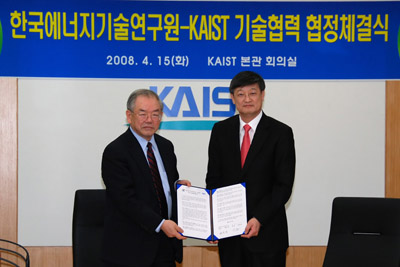 KAIST Inks Agreement with KERI for EEWS Technological Cooperation
KAIST concluded an agreement with the Korea Institute of Energy Research for technological cooperation in the research on the four global issues of energy, environment, water and sustainability (EEWS) on Tuesday (April 15).
The agreement was signed by KAIST President Nam-Pyo Suh and Moon-Hee Han, director of the Korea Institute of Energy Research at the KAIST.
The agreement calls for building a cooperative network for exchanges of personnel and information, and joint use of research facilities and equipment between the two institutions. Under the agreement, KAIST and KIER will also jointly conduct scientific researches.
When it comes to personnel exchange, KAIST will appoint researchers of KIER as adjunct professors of KAIST, while KIER will appoint KAIST professors as its adjunct researchers. Undergraduate students of KAIST will be given an opportunity to join government-commissioned projects and participate in an internship program of the institute.
2008.04.16 View 20516
KAIST Inks Agreement with KERI for EEWS Technological Cooperation
KAIST concluded an agreement with the Korea Institute of Energy Research for technological cooperation in the research on the four global issues of energy, environment, water and sustainability (EEWS) on Tuesday (April 15).
The agreement was signed by KAIST President Nam-Pyo Suh and Moon-Hee Han, director of the Korea Institute of Energy Research at the KAIST.
The agreement calls for building a cooperative network for exchanges of personnel and information, and joint use of research facilities and equipment between the two institutions. Under the agreement, KAIST and KIER will also jointly conduct scientific researches.
When it comes to personnel exchange, KAIST will appoint researchers of KIER as adjunct professors of KAIST, while KIER will appoint KAIST professors as its adjunct researchers. Undergraduate students of KAIST will be given an opportunity to join government-commissioned projects and participate in an internship program of the institute.
2008.04.16 View 20516 -
 KAIST, K-Water Sign MOU for Cooperation in EEWS
KAIST has signed a memorandum of understanding with the Korea Water Resources Corporation (K-Water), a state-invested organization responsible for the development and management of inland water resources, for cooperation in the research on the four global issues of energy, environment, water and sustainability (EEWS).
The MOU was signed by KAIST President Suh Nam-Pyo and K-Water President Kwak Kyul-ho on Feb. 22 at the KAIST.
KAIST and K-Water agreed to establish a cooperative network for exchanges of personnel and research resources for advanced R&D on EEWS. The agreement has been reached on the common belief that EEWS is the most imminent problem facing the humanity in the 21st century.
Under the MOU, KAIST and K-Water will work together to build a EEWS global network; to develop policies and conduct researches to strengthen the competitiveness of Korea"s water industry; and to train and exchange research manpower of the two institutions. The agreement also calls for sharing technological information, exchanging research results and publications; and jointly hosting symposiums and workshops.
2008.03.09 View 18409
KAIST, K-Water Sign MOU for Cooperation in EEWS
KAIST has signed a memorandum of understanding with the Korea Water Resources Corporation (K-Water), a state-invested organization responsible for the development and management of inland water resources, for cooperation in the research on the four global issues of energy, environment, water and sustainability (EEWS).
The MOU was signed by KAIST President Suh Nam-Pyo and K-Water President Kwak Kyul-ho on Feb. 22 at the KAIST.
KAIST and K-Water agreed to establish a cooperative network for exchanges of personnel and research resources for advanced R&D on EEWS. The agreement has been reached on the common belief that EEWS is the most imminent problem facing the humanity in the 21st century.
Under the MOU, KAIST and K-Water will work together to build a EEWS global network; to develop policies and conduct researches to strengthen the competitiveness of Korea"s water industry; and to train and exchange research manpower of the two institutions. The agreement also calls for sharing technological information, exchanging research results and publications; and jointly hosting symposiums and workshops.
2008.03.09 View 18409 -
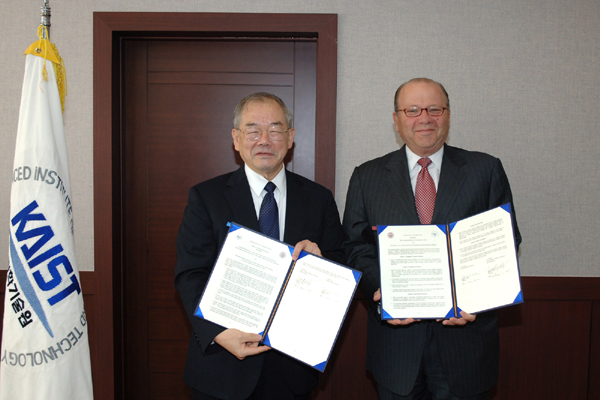 KAIST and Carnegie Mellon University establish a Dual Degree Program
Korea Advanced Institute of Science and Technology (KAIST) and Carnegie Mellon University make an agreement on collaboration in research and education, and a dual degree program.
KAIST and Carnegie Mellon make an agreement on ▲Exchange of Faculty Members ▲Exchange of Students ▲Dual Degree Program and ▲ Exploring cooperation in education and research. Presidents of both Universities had a signing ceremony at 11 A.M on Friday, Oct. 5th, 2007.
▲Lectures, joint research and exchange of faculty members ▲Undergraduate/graduate student exchange up to five students from one University each year ▲Dual degree program at the Ph. D. level ▲Opportunities for joint research projects and conferences will be explored according to the agreement between the two Universities.
KAIST and Carnegie Mellon have created a new dual degree program for Ph.D. students in civil and environmental engineering. Students admitted through the dual degree program are required to spend minimum 2 academic years in residence at each University. The total number of the student candidates participating in this program shall not exceed five in any given academic year initially. The students who met the graduation requirements shall be awarded two PhD degrees, one from KAIST and the other from Carnegie Mellon. All of its courses at KAIST are taught in English, which is the case starting in Fall 2007. Both Universities will explore the concept of sharing courses taught in English using videoconferencing technologies.
KAIST President Nam Pyo Suh said “We are delighted to have President Jared L. Cohon of Carnegie Mellon visit KAIST. I am looking forward to discussing various issues related to higher education and signing the Memorandum of Understanding between the two universities for student/faculty exchange programs, joint research, and the Carnegie Mellon- KAIST dual-degree program in civil and environment engineering. The dual degree program will initially begin in civil and environment engineering, and we hope to expand this to other areas in the future. Our goal is to generate future leaders who are able to lead global enterprises and conduct interdisciplinary research. This can be done through collaboration among leading scholars at Carnegie Mellon and KAIST. Our hope is that we can solve serious problems of the 21st century through the collaboration between our two institutions. I am especially excited to establish such a collaboration with Carnegie Mellon, my alma mater."
“Carnegie Mellon is well-suited to collaborate with KAIST. We believe this agreement will be a catalyst for future educational and research opportunities. I am especially pleased that this partnership is with an institution of KAIST"s stature” said Cohon.
About Carnegie Mellon:
Carnegie Mellon is a private research university with a distinctive mix of programs in engineering, computer science, robotics, business, public policy, fine arts and the humanities. More than 10,000 undergraduate and graduate students receive an education characterized by its focus on creating and implementing solutions for real problems, interdisciplinary collaboration, and innovation. A small student-to-faculty ratio provides an opportunity for close interaction between students and professors. While technology is pervasive on its 144-acre Pittsburgh campus, Carnegie Mellon is also distinctive among leading research universities for the world-renowned programs in its College of Fine Arts. A global university, Carnegie Mellon has campuses in Silicon Valley, Calif., and Qatar, and programs in Asia, Australia and Europe. For more, see www.cmu.edu ..
2007.10.09 View 21850
KAIST and Carnegie Mellon University establish a Dual Degree Program
Korea Advanced Institute of Science and Technology (KAIST) and Carnegie Mellon University make an agreement on collaboration in research and education, and a dual degree program.
KAIST and Carnegie Mellon make an agreement on ▲Exchange of Faculty Members ▲Exchange of Students ▲Dual Degree Program and ▲ Exploring cooperation in education and research. Presidents of both Universities had a signing ceremony at 11 A.M on Friday, Oct. 5th, 2007.
▲Lectures, joint research and exchange of faculty members ▲Undergraduate/graduate student exchange up to five students from one University each year ▲Dual degree program at the Ph. D. level ▲Opportunities for joint research projects and conferences will be explored according to the agreement between the two Universities.
KAIST and Carnegie Mellon have created a new dual degree program for Ph.D. students in civil and environmental engineering. Students admitted through the dual degree program are required to spend minimum 2 academic years in residence at each University. The total number of the student candidates participating in this program shall not exceed five in any given academic year initially. The students who met the graduation requirements shall be awarded two PhD degrees, one from KAIST and the other from Carnegie Mellon. All of its courses at KAIST are taught in English, which is the case starting in Fall 2007. Both Universities will explore the concept of sharing courses taught in English using videoconferencing technologies.
KAIST President Nam Pyo Suh said “We are delighted to have President Jared L. Cohon of Carnegie Mellon visit KAIST. I am looking forward to discussing various issues related to higher education and signing the Memorandum of Understanding between the two universities for student/faculty exchange programs, joint research, and the Carnegie Mellon- KAIST dual-degree program in civil and environment engineering. The dual degree program will initially begin in civil and environment engineering, and we hope to expand this to other areas in the future. Our goal is to generate future leaders who are able to lead global enterprises and conduct interdisciplinary research. This can be done through collaboration among leading scholars at Carnegie Mellon and KAIST. Our hope is that we can solve serious problems of the 21st century through the collaboration between our two institutions. I am especially excited to establish such a collaboration with Carnegie Mellon, my alma mater."
“Carnegie Mellon is well-suited to collaborate with KAIST. We believe this agreement will be a catalyst for future educational and research opportunities. I am especially pleased that this partnership is with an institution of KAIST"s stature” said Cohon.
About Carnegie Mellon:
Carnegie Mellon is a private research university with a distinctive mix of programs in engineering, computer science, robotics, business, public policy, fine arts and the humanities. More than 10,000 undergraduate and graduate students receive an education characterized by its focus on creating and implementing solutions for real problems, interdisciplinary collaboration, and innovation. A small student-to-faculty ratio provides an opportunity for close interaction between students and professors. While technology is pervasive on its 144-acre Pittsburgh campus, Carnegie Mellon is also distinctive among leading research universities for the world-renowned programs in its College of Fine Arts. A global university, Carnegie Mellon has campuses in Silicon Valley, Calif., and Qatar, and programs in Asia, Australia and Europe. For more, see www.cmu.edu ..
2007.10.09 View 21850